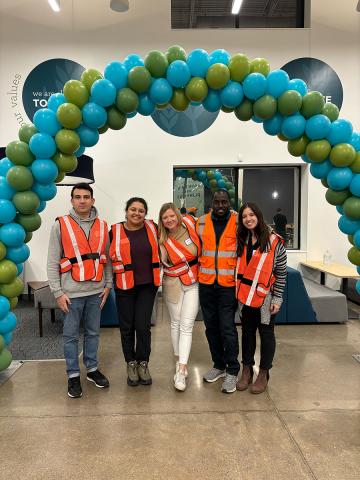
Supply chain master’s students support nonprofit’s hunger relief initiative
Monday, February 26, 2024
Minnesotans visited food shelves a record 7.5 million times in 2023, indicating a rising need amidst sky-high grocery, gas, and utility prices coupled with the expiration of pandemic-era federal aid. As a leading hunger relief organization, Second Harvest Heartland (SHH) witnesses this need first-hand. Last month, it announced a bold goal to cut hunger in half for all Minnesotans by 2030 through the Make Hunger History initiative. Some Carlson School students are already playing a role in achieving this goal.
Through an MS in Supply Chain Management (MS SCM) class project, students were tasked with identifying supply chain key performance indicators (KPIs) and best practices for managing them. Trevor Nelson, ‘18 BSB, senior business analyst for supply chain at SHH, turned to his former teacher, Professor Susan Meyer Goldstein, to collaborate on the project. Together with Professor Karen Donohue, academic director of the MS SCM program, students toured Second Harvest Heartland’s operations in the summer of 2023 and identified project goals from there.
“It gave us a unique opportunity to leverage the students’ research powers and their experience,” says Nelson. “A lot of them are coming from different backgrounds, and we had 18 individuals with over 50 years of working experience on this. We can extend that into fresh perspectives and that was something I was excited about.”
Students were broken up into four teams and tackled questions about the speed of inventory turnover in various departments (i.e. freezer, cold, dry), looking for areas of necessary improvement for moving more food, and also about the potential for changes to warehouse operations (i.e. layout, labor tasks, etc.).
“I think of this project as a win-win-win,” says Goldstein. “It’s a win for our students to begin applying what they’re learning in classes in a very real sense, in an industry that none of them are working in. It’s a win for Second Harvest Heartland, for them to have an amazing set of supply chain talent. Our students brought a lot of expertise and a lot of energy. The third win is that nobody should be hungry in the state of Minnesota and so if we can contribute to improving the supply chain to feed more of our neighbors, that’s a win.”
One team took the approach of using a standard “ABC analysis” tool to help categorize inventory, in which the concept is to identify where an organization can have the most impact.
“It was interesting to see that their inventory is doing great for what they need it to do, to reaffirm that where they’re at is really good,” says team member and current MS SCM student Nykeesha Greer, who is a supply chain analyst at 3M. “But if they want to tweak some things…if they were able to allocate that space to something else, who’s to say how many more neighbors you could feed?”
“It was such a good hands-on experience, I can’t wait to see how they grow and hopefully how they take some of our recommendations and put them to use,” says another team member and current MS SCM student Jane Jaeger, who is a senior sourcing manager at Target.
Nelson says the insight gained from the student’s work was invaluable.
“To make hunger history, we need to be operating a more efficient and cost-effective supply chain,” he says. “Any dollar saved, that gives us more funds to invest in the community.”
This project also gave Nelson the added bonus of sharing a path less-traveled that inspired many of the students to look for ways in which they could contribute to the nonprofit sector in the future.
“For me personally, I was really excited to bring this to the Carlson School students. Because I think when people think about supply chain, they don’t think nonprofits and community impact,” says Nelson. “I’ve already seen the impact I’ve been able to make at Second Harvest Heartland with not just my supply chain education, but specifically coming from the Carlson School and all the other aspects of the curriculum that help set you up for success. What was important to me was to take this opportunity to make sure every student in that master’s program knows that their skills and experience can be used to make a difference in the community.”
For anyone interested in getting involved with Make Hunger History, there are several ways to make a difference, including donating to a local food shelf, volunteering for a hunger relief program in your area, or lending your voice to statewide advocacy efforts.
